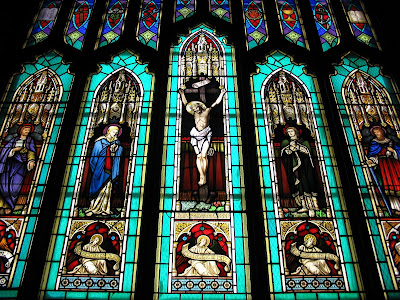Jesus is The One through whom are all things—all the lives and deaths and loves and relationships that bring us together this afternoon. Jesus is The One, the Bible tells us, through whom we all exist. (1Cor8.6) Jesus. Full of grace and mercy. Exemplar and perfect embodiment of the Father’s love. Jesus. He brought Ken and Victoria together in the first place, made them one flesh, and—just as we heard in the reading from John’s Gospel—went on ahead to prepare a place for them where they will always be with him where he is. With Jesus himself in that “house in heaven…made…by God himself and not by human hands,” (2Cor5.1) we heard about in the first reading from St Paul’s second letter to the Corinthians—“wearing heavenly bodies like new clothing.” In death, “swallowed up by life”! At home with The LORD forever and ever. Amen.
Good to know. Together again. In the presence of God. We don’t have to worry about Victoria and Ken any more.
Ken once told me that he’d built a house, all with hand tools. I love that idea that he will now, or soon, be living in one he didn’t have to build or buy himself!
But what about us? Still weary, groaning and sighing in these earthly bodies, and living in earthly tents, as St Paul put it in that first reading. How can we have the confidence he describes, “even though we know that as long as we live in these bodies we are not at home with the Lord”? (2Cor5.6) “We live by believing,” writes Paul, “and not by seeing.” Walking by faith, not by sight.
Jesus says something similar in the second reading: “Don’t let your hearts be troubled,” at times like this, he said. Just trust because, even though you might not see it right now, especially if you’re grieving and in pain, and somebody you loved very much dies there is a heavenly and spiritual reality that will swallow up these earthly bodies—as fearfully and wonderfully made as we are—with a such a splendour of glory and beauty that our earthly understanding can only barely, scarcely glimpse let alone comprehend. Because, “There is more than enough room in my Father’s home.” More than enough—for Victoria and Ken and you and me.
You know the way, Jesus said. Thomas said, No, we don’t. We don’t know where you’re going so how on earth can we know the way?
Believe, wrote Paul. Trust, said Jesus. This is how, wrote Ken in one of his wonderful poems (did you know Ken was no mean poet?) called Ordinary Time (which is the church calendar season we’re in now)—written at a different time of year—one snowy, pre-Lent, February:
This is no festal day;
no saints nor martyrs
of any note have glorified this day
living or dying.
The season plods toward
the long deep valley of Lent.
Snow obscures
the end of a late February
afternoon, stopping vision,
wrapping us
in a white robe of anonymity.
- Now may whatever martyrs and saints there be
preserve us; may the God
whom we glimpse only dimly,
now and then,
through the frosted windows, remember our names,
bring us safely to our rest,
and pardon us
if we should celebrate
this day our own
small saints: the woman who with grace endured
martyrdom by cancer;
the man who smiled through a lifetime’s petty chores;
the father who built with quiet hands a workman’s muscular prayers;
the mother who loved us,
against all odds.
On days like this, believing and trusting, we, too, can celebrate our own small saints (like Vic and Ken), celebrate the grace to endure suffering and cancer, celebrate those smiles through our lifetime’s petty chores, pray muscular prayers (there are some in this service) and love one another against all odds—like that mother in Ken’s poem and the Father Jesus tells us about,
These are all wise ways to live the way, the truth and the life Jesus provides. Look him up if you haven’t already. Believe and trust in him. Be confident in his promises—good ways to honour Vic and Ken, too. Then these dying bodies of ours will be swallowed up by the abundant and eternal life that can only come through Jesus.

No comments:
Post a Comment